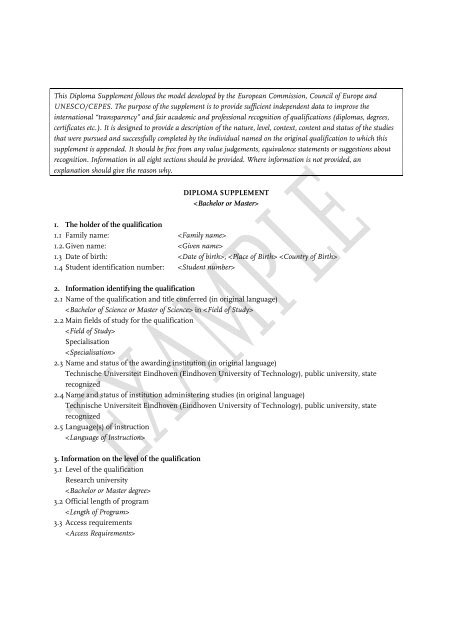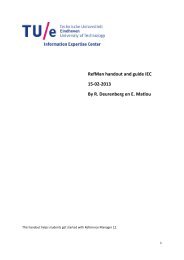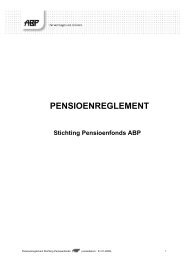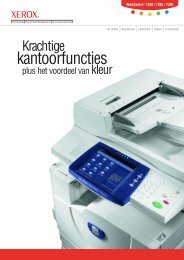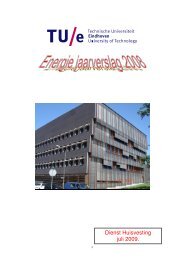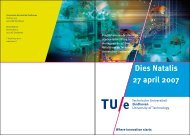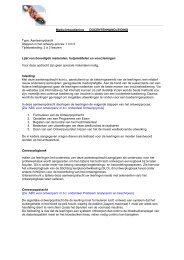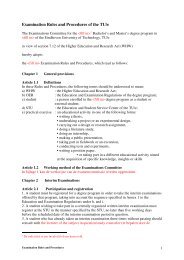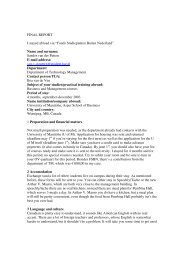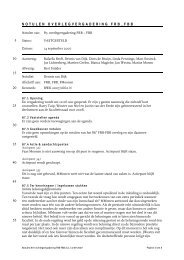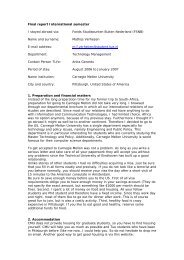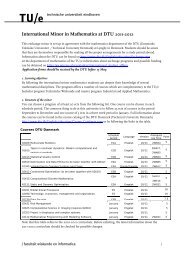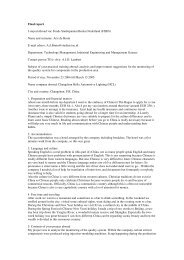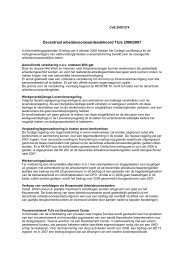This Diploma Supplement follows the model developed by the ...
This Diploma Supplement follows the model developed by the ...
This Diploma Supplement follows the model developed by the ...
You also want an ePaper? Increase the reach of your titles
YUMPU automatically turns print PDFs into web optimized ePapers that Google loves.
<strong>This</strong> <strong>Diploma</strong> <strong>Supplement</strong> <strong>follows</strong> <strong>the</strong> <strong>model</strong> <strong>developed</strong> <strong>by</strong> <strong>the</strong> European Commission, Council of Europe and<br />
UNESCO/CEPES. The purpose of <strong>the</strong> supplement is to provide sufficient independent data to improve <strong>the</strong><br />
international “transparency” and fair academic and professional recognition of qualifications (diplomas, degrees,<br />
certificates etc.). It is designed to provide a description of <strong>the</strong> nature, level, context, content and status of <strong>the</strong> studies<br />
that were pursued and successfully completed <strong>by</strong> <strong>the</strong> individual named on <strong>the</strong> original qualification to which this<br />
supplement is appended. It should be free from any value judgements, equivalence statements or suggestions about<br />
recognition. Information in all eight sections should be provided. Where information is not provided, an<br />
explanation should give <strong>the</strong> reason why.<br />
DIPLOMA SUPPLEMENT<br />
<br />
1. The holder of <strong>the</strong> qualification<br />
1.1 Family name: <br />
1.2. Given name: <br />
1.3 Date of birth: , <br />
1.4 Student identification number: <br />
2. Information identifying <strong>the</strong> qualification<br />
2.1 Name of <strong>the</strong> qualification and title conferred (in original language)<br />
in <br />
2.2 Main fields of study for <strong>the</strong> qualification<br />
<br />
Specialisation<br />
<br />
2.3 Name and status of <strong>the</strong> awarding institution (in original language)<br />
Technische Universiteit Eindhoven (Eindhoven University of Technology), public university, state<br />
recognized<br />
2.4 Name and status of institution administering studies (in original language)<br />
Technische Universiteit Eindhoven (Eindhoven University of Technology), public university, state<br />
recognized<br />
2.5 Language(s) of instruction<br />
<br />
3. Information on <strong>the</strong> level of <strong>the</strong> qualification<br />
3.1 Level of <strong>the</strong> qualification<br />
Research university<br />
<br />
3.2 Official length of program<br />
<br />
3.3 Access requirements<br />
4. Information on <strong>the</strong> contents and results gained<br />
4.1 Mode of study<br />
full time<br />
4.2 Program requirements<br />
Relevant information regarding modules and grades obtained is provided in <strong>the</strong> transcript of records<br />
(see 4.3). The objectives of <strong>the</strong> program in are<br />
such that graduates:<br />
- are qualified to degree level within <strong>the</strong> domain of ‘science engineering & technology’,<br />
- are competent in <strong>the</strong> relevant domain-specific discipline(s), namely ,<br />
- are able to conduct research and design independently,<br />
- have <strong>the</strong> ability and attitude to include o<strong>the</strong>r disciplines in <strong>the</strong>ir research, where necessary,<br />
- have a scientific approach to complex problems and ideas,<br />
- possess intellectual skills that enable <strong>the</strong>m to reflect critically, reason and form opinions,<br />
- are good at communicating <strong>the</strong> results of <strong>the</strong>ir learning, thinking and decision-making processes at<br />
international level,<br />
- are aware of <strong>the</strong> temporal and social context of science and technology (comprehension and<br />
analysis) and can integrate this in <strong>the</strong>ir scientific work,<br />
- in addition to a recognizable domain-specific profile, possess a sufficiently broad basis to be able to<br />
work in an interdisciplinary and multidisciplinary context, <strong>the</strong> latter in <strong>the</strong> sense of being focused<br />
on o<strong>the</strong>r relevant disciplines needed to solve <strong>the</strong> design or research problem in question.<br />
- actively seeks new potential applications, taking into consideration <strong>the</strong> social context.<br />
4.3 Program details and <strong>the</strong> individual grades/credits obtained<br />
The following index lists <strong>the</strong> courses of <strong>the</strong> program in <strong>the</strong> student has attended, <strong>the</strong> number of ECTS credits attributed to each course and <strong>the</strong> final<br />
mark <strong>the</strong> student has acquired for <strong>the</strong> course<br />
Components of <strong>the</strong> study program belonging to <strong>the</strong> master of science program<br />
Subject credits(ECTS)marks<br />
<br />
<br />
<br />
<br />
<br />
<br />
<br />
…..<br />
Total
4.4 Grading scheme and grade distribution<br />
The Dutch grading system, used from elementary through to university education is <strong>the</strong> 1 to 10 scale<br />
given in de <strong>the</strong> following table, in which 10 is <strong>the</strong> highest grade, 6 <strong>the</strong> minimum pass, and 1 <strong>the</strong> lowest<br />
grade. However, 10 is rarely awarded.<br />
Official Dutch grading scheme<br />
10 Excellent<br />
9 Very good<br />
8 Good<br />
7 Satisfactory<br />
6 Sufficient<br />
5 Fail<br />
4-1 Fail<br />
4.5 Overall classification of <strong>the</strong> qualification<br />
<br />
5. Information on <strong>the</strong> function of <strong>the</strong> qualification<br />
5.1 Access to fur<strong>the</strong>r study<br />
<br />
5.2 Professional status<br />
Not applicable<br />
6. Additional information:<br />
6.1 Additional information<br />
<strong>This</strong> program received accreditation <strong>by</strong> <strong>the</strong> Ne<strong>the</strong>rlands-Flemish Accreditation Organisation (NVAO) on<br />
.<br />
6.2 Fur<strong>the</strong>r information sources<br />
Fur<strong>the</strong>r information can be obtained from <strong>the</strong> department in question:<br />
Technische Universiteit Eindhoven<br />
<br />
P.O. Box 513<br />
5600 MB Eindhoven<br />
The Ne<strong>the</strong>rlands<br />
Internet: http://www.tue.nl/en_index.html<br />
Visiting address:<br />
Technische Universiteit Eindhoven<br />
Den Dolech 2<br />
5612 AZ Eindhoven<br />
The Ne<strong>the</strong>rlands
7. Certification of <strong>Supplement</strong>:<br />
Eindhoven (The Ne<strong>the</strong>rlands) Date: <br />
On behalf of <strong>the</strong> Board of Examiners,
8. Information on <strong>the</strong> Dutch higher education system:<br />
The higher education system in <strong>the</strong> Ne<strong>the</strong>rlands is based on a three-cycle degree system, consisting of a<br />
bachelor, master and PhD. Until 2002, <strong>the</strong> first two cycles at research universities were combined in a<br />
single integrated cycle. The three-cycle system was officially introduced in <strong>the</strong> Ne<strong>the</strong>rlands at <strong>the</strong> beginning<br />
of <strong>the</strong> academic year 2002-2003, but degrees from <strong>the</strong> former, integrated system can be awarded until<br />
2007-2009. For this reason, both <strong>the</strong> old and new systems will be described here.<br />
The Ne<strong>the</strong>rlands has a binary system of higher education, which means <strong>the</strong>re are two types of programmes:<br />
research oriented education (wetenschappelijk onderwijs, WO), traditionally offered <strong>by</strong> research universities,<br />
and professional higher education (hoger beroepsonderwijs, HBO), traditionally offered <strong>by</strong> hogescholen, or<br />
universities of professional education. In this description, <strong>the</strong> Dutch abbreviations WO and HBO will be<br />
used.<br />
primary and secondary education<br />
Children are allowed to begin school at <strong>the</strong> age of four, but are not legally required to do so until <strong>the</strong> age of<br />
five. Primary education lasts eight years (of which seven are compulsory), in <strong>the</strong> last year of which pupils<br />
are advised as to <strong>the</strong> type of secondary education <strong>the</strong>y should pursue.<br />
Secondary education, which begins at <strong>the</strong> age of 12 and is compulsory until <strong>the</strong> age of 16, is offered at<br />
several levels. VMBO programmes (four years) combine general and vocational education, after which<br />
pupils can continue in senior secondary vocational education and training (MBO) lasting one to four years.<br />
The two programmes of general education that grant admission to higher education are HAVO (five years)<br />
and VWO (six years). Pupils are enrolled according to <strong>the</strong>ir ability, and although VWO is more rigorous,<br />
both HAVO and VWO can be characterized as selective types of secondary education. The VWO curriculum<br />
prepares pupils for university, and only <strong>the</strong> VWO diploma grants access to WO. The HAVO diploma is <strong>the</strong><br />
minimum requirement for access to HBO. The last two years of HAVO and <strong>the</strong> last three years of VWO are<br />
referred to as <strong>the</strong> tweede fase (literally, second phase), or upper secondary education. During<br />
<strong>the</strong>se years, pupils focus on one of four subject clusters (profielen), each of which emphasizes a certain field<br />
of study in addition to satisfying general education requirements. Each cluster is designed to prepare pupils<br />
for programmes of study at <strong>the</strong> tertiary level. A pupil enrolled in VWO or HAVO can choose from <strong>the</strong><br />
following subject clusters:<br />
1) Science and Technology (Natuur en Techniek)<br />
2) Science and Health (Natuur en Gezondheid)<br />
3) Economics and Society (Economie en Maatschappij)<br />
4) Culture and Society (Cultuur en Maatschappij)<br />
senior secondary vocational education and training (mbo)<br />
Senior secondary vocational education and training (MBO, secundair beroepsonderwijs) is offered in <strong>the</strong><br />
areas of economics, technology, health, personal care, welfare and agriculture. MBO programmes vary in<br />
length from one to four years as well as in level (1 to 4). Graduates of VMBO programmes are eligible for<br />
admission to MBO, and completion of MBO programmes at level 4 qualifies pupils for access to HBO.
higher education<br />
Higher education in <strong>the</strong> Ne<strong>the</strong>rlands is offered at two types1 of institution: research universities<br />
(universiteiten) and universities of professional education (hogescholen). Research universities include<br />
general universities, universities specializing in engineering and agriculture, and <strong>the</strong> Open University.<br />
Research universities are primarily responsible for offering research-oriented programmes<br />
(Wetenschappelijk Onderwijs, WO). Universities of professional education include general institutions as well<br />
as institutions specializing in a specific field such as agriculture, fine and performing arts, or teacher<br />
training. Universities of professional education are primarily responsible for offering programmes of<br />
higher professional education (Hoger Beroepsonderwijs, HBO), which prepare students for particular<br />
professions. These tend to be more practically oriented than programmes offered <strong>by</strong> research universities.<br />
WO until 2002<br />
Dutch research universities provide education and conduct research in a wide range of disciplines: language<br />
and culture, behaviour and society, economics, law, medical and health sciences, natural sciences,<br />
engineering, and agriculture. Until 2002, initial study programmes lasted four years in most fields, but five<br />
years in agriculture, engineering, ma<strong>the</strong>matics and most natural sciences, at <strong>the</strong> end of which <strong>the</strong> doctorale<br />
getuigschrift (doctoraal degree) or getuigschrift van het afsluitend examen (final examination degree certificate)<br />
was awarded. Integrated study programmes in medical and health sciences lasted ei<strong>the</strong>r five years<br />
(dentistry), or six years (medicine, pharmacy, veterinary medicine). The first year of every programme,<br />
referred to as <strong>the</strong> propedeuse, provided students with introductory courses fundamental to <strong>the</strong> field in<br />
question. In <strong>the</strong> years that followed, every doctoraal programme featured training in research methodology<br />
and completion of a <strong>the</strong>sis as required components. Graduates of doctoraal programmes have been<br />
permitted <strong>by</strong> law to use a particular title, depending on <strong>the</strong> discipline. Graduates in engineering and<br />
technology and in agriculture and <strong>the</strong> natural environment received <strong>the</strong> title of ingenieur, abbreviated to ir.<br />
Graduates in law obtained <strong>the</strong> title of meester, abbreviated to mr. Graduates in all o<strong>the</strong>r disciplines obtained<br />
<strong>the</strong> title of doctorandus, abbreviated to drs. All graduates could also opt to use <strong>the</strong> title Master (M.) if <strong>the</strong>y<br />
wished. Graduation from a doctoraal programme made one eligible to pursue a doctorate. All research<br />
universities in <strong>the</strong> Ne<strong>the</strong>rlands were entitled to award <strong>the</strong> country's highest academic degree, <strong>the</strong> doctoraat,<br />
which entitles a person to use <strong>the</strong> title doctor, abbreviated to dr. The process <strong>by</strong> which a doctorate is obtained<br />
is referred to as <strong>the</strong> promotie. The doctorate is primarily a research degree, for which a dissertation based on<br />
original research must be written and publicly defended. The minimum amount of time required to<br />
complete a doctorate was four years.<br />
HBO until 2002<br />
Dutch universities of professional education prepare students for a wide variety of careers in seven sectors:<br />
agriculture, engineering and technology, economics and business administration, health care, fine and<br />
performing arts, education (teacher training), and social welfare. Initial study programmes lasted four<br />
years, at <strong>the</strong> end of which <strong>the</strong> Getuigschrift Hoger Beroepsonderwijs or HBO degree was awarded. The first<br />
year of every programme, referred to as <strong>the</strong> propedeuse, consisted of introductory courses fundamental to <strong>the</strong><br />
discipline in question. In addition to lectures, seminars, projects and independent study, students were<br />
required to complete an internship or work placement (stage) which normally takes up part of <strong>the</strong> third year<br />
of study, as well as a final project or a major paper in <strong>the</strong> fourth year. Graduates of an HBO programme in<br />
engineering and technology or agriculture and <strong>the</strong> natural environment received <strong>the</strong> title of ingenieur,<br />
abbreviated to ing. Graduates in all o<strong>the</strong>r disciplines obtained <strong>the</strong> title of baccalaureus, abbreviated to bc. All
graduates could also opt to use <strong>the</strong> title Bachelor (B.) if <strong>the</strong>y wished. HBO graduates are fully qualified to<br />
practise <strong>the</strong>ir profession without any fur<strong>the</strong>r study, licensing or registration with a professional association.<br />
After 2002<br />
Since September 2002, <strong>the</strong> higher education system in <strong>the</strong> Ne<strong>the</strong>rlands has been organized around a threecycle<br />
degree system consisting of bachelor, master and PhD degrees. At <strong>the</strong> same time, <strong>the</strong> ECTS credit<br />
system was adopted as a way of quantifying periods of study. The higher education system continues to be a<br />
binary system, however, with a distinction between research-oriented education (wetenschappelijk onderwijs,<br />
WO) and professional higher education (hoger beroepsonderwijs, HBO).<br />
The focus of degree programmes determines both <strong>the</strong> number of credits required to complete <strong>the</strong><br />
programme and <strong>the</strong> degree which is awarded. A WO bachelor's programme requires <strong>the</strong> completion of 180<br />
credits (3 years) and graduates obtain <strong>the</strong> degree Bachelor of Arts or Bachelor of Science (BA/BSc),<br />
depending on <strong>the</strong> discipline. An HBO bachelor's programme requires <strong>the</strong> completion of 240 credits (4<br />
years), and graduates obtain a degree indicating <strong>the</strong> field of study (for example, Bachelor of Engineering, B.<br />
Eng., or Bachelor of Nursing, B. Nursing). The old title appropriate to <strong>the</strong> discipline in question (bc., ing.)<br />
may still be used. Institutions offer WO master's programmes that in most cases require <strong>the</strong> completion of<br />
60 or 120 credits (1 or 2 years). Some programmes require 90 (1,5 years) or more than 120 credits. In<br />
engineering, agriculture, and math and <strong>the</strong> natural sciences, 120 credits are always required. Graduates<br />
obtain <strong>the</strong> degree of Master of Arts or Master of Science (MA/MSc). The old title appropriate to <strong>the</strong><br />
discipline in question (drs., mr., ir.) may still be used. An HBO master's programme requires <strong>the</strong><br />
completion of 60 to 120 credits and graduates obtain a degree indicating <strong>the</strong> field of study<br />
(for example, Master of Social Work, MSW).<br />
The third cycle of higher education, leading to a doctor's degree, will be offered only <strong>by</strong> research universities<br />
in <strong>the</strong> same way as described above.<br />
Requirements for Admission to Higher Education<br />
For access to WO bachelor's programmes, students are required to have a VWO diploma or to have<br />
completed <strong>the</strong> first year (60 credits) of an HBO programme. The minimum access requirement for HBO is<br />
ei<strong>the</strong>r a HAVO diploma or a level-4 MBO diploma. The VWO diploma also grants access to HBO. For<br />
access to both types of higher education, pupils are required to have completed at least one of <strong>the</strong> subject<br />
clusters that fulfills <strong>the</strong> requirements for <strong>the</strong> higher education programme in question. A quota, or numerus<br />
fixus, applies for access to certain programmes, primarily in <strong>the</strong> medical sciences, and places are allocated<br />
using a weighted lottery. Potential students older than 21 years of age who do not possess one of <strong>the</strong><br />
qualifications mentioned above can qualify for access to higher education on <strong>the</strong> basis of an entrance<br />
examination and assessment. The only access requirement for <strong>the</strong> Open University is that applicants be at<br />
least 18 years of age.<br />
For access to all master's programmes, a bachelor's degree in one or more specified disciplines is required,<br />
in some cases in combination with o<strong>the</strong>r requirements. Graduates with an HBO bachelor's degree may<br />
have to complete additional requirements for access to a WO master's degree programme.
Credit System and Grading<br />
Workload is measured in credits (studiepunten). Until 2002, one credit represented one week of full-time<br />
study (40 hours, counting both contact hours and hours spent studying and preparing assignments). Study<br />
programmes offered <strong>by</strong> research universities and universities of professional education lasting four years<br />
required completion of a total of 168 credits, or 42 credits per year. The academic year was (and still is) 42<br />
weeks long. Since 2002, a student's workload is measured in ECTS credits, where<strong>by</strong>-according to Dutch<br />
law-one credit represents 28 hours of work and 60 credits represents one year of full-time study.<br />
The grading system has been <strong>the</strong> same for several decades: <strong>the</strong> scale is from 1 (very poor) to 10<br />
(outstanding). The lowest passing grade is 6; 9s are seldom given and 10s are extremely rare and grades 1-3<br />
are hardly ever used.<br />
Accreditation and Quality Assurance<br />
A guaranteed standard of higher education is maintained through a national system of legal regulation and<br />
quality assurance. The Ministry of Education, Culture and Science is responsible for legislation pertaining<br />
to education. The agriculture and public health ministries play an important role in monitoring <strong>the</strong> content<br />
of study programmes in <strong>the</strong>ir respective fields, and until 2002, <strong>the</strong> VSNU (Association of Universities in<br />
<strong>the</strong> Ne<strong>the</strong>rlands) and <strong>the</strong> HBO-raad (Ne<strong>the</strong>rlands Association of Universities of Professional Education)<br />
were responsible for implementing <strong>the</strong> system of quality assurance. <strong>This</strong> system has been recently<br />
converted to a system of accreditation. As of 2002, responsibility for accreditation lies with <strong>the</strong> Ne<strong>the</strong>rlands-<br />
Flemish Accreditation Organization (NVAO). According to <strong>the</strong> section of <strong>the</strong> Dutch Higher Education Act<br />
dealing with <strong>the</strong> accreditation of higher education (2002), all degree programmes offered <strong>by</strong> research<br />
universities and universities of professional education will be evaluated according to established criteria,<br />
and programmes that meet those criteria will be accredited: i.e. recognized for a period of six years. Only<br />
accredited programmes will be eligible for government funding, and students will receive financial aid and<br />
graduate with a recognized degree only when enrolled in, or after having completed, an accredited degree<br />
programme. Accredited programmes will be listed in <strong>the</strong> Central Register of Higher Education Study<br />
Programmes (CROHO) and <strong>the</strong> information will of course be available to <strong>the</strong> public. The NVAO plans to<br />
review all study programmes <strong>by</strong> 2006. Before that time, all programmes that are registered in CROHO that<br />
have adhered to <strong>the</strong> quality assurance regulations, are considered to be recognized <strong>by</strong> law. Besides <strong>the</strong><br />
accreditation of degree programmes, <strong>the</strong> Ne<strong>the</strong>rlands has a system <strong>by</strong> which <strong>the</strong> Ministry of Education,<br />
Culture and Science recognizes higher education institutions <strong>by</strong> conferring on <strong>the</strong>m <strong>the</strong> status of ei<strong>the</strong>r<br />
bekostigd (funded) or aangewezen (approved). Bekostigd indicates that <strong>the</strong> institution is fully financed <strong>by</strong> <strong>the</strong><br />
government. Aangewezen indicates that <strong>the</strong> institution does not receive funds from <strong>the</strong> government and has<br />
to rely on its own sources of funding. Whe<strong>the</strong>r a degree programme is offered <strong>by</strong> a 'funded' or an<br />
'approved' institution, it must be accredited and registered in CROHO to be considered recognized.<br />
According to legislation regarding accreditation, institutions are required to write on degree certificates <strong>the</strong><br />
date that <strong>the</strong> degree programme in question was granted accreditation. At this stage, only a few<br />
programmes have actually been accredited. Because accreditation is an ongoing process, it will be important<br />
that people who review Dutch degrees make sure that a programme was accredited at <strong>the</strong> time <strong>the</strong> degree<br />
was awarded. Once accredited, <strong>the</strong> validity of <strong>the</strong> accreditation of that particular degree is of course<br />
permanent.


